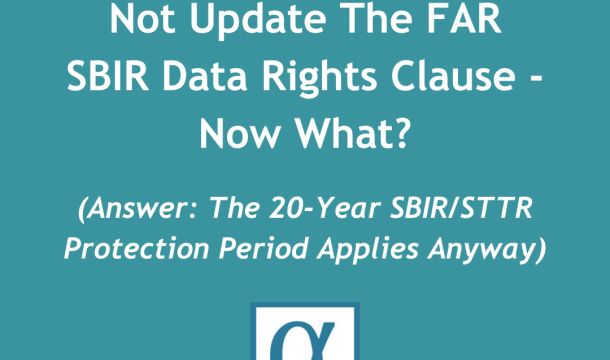The GovCon Bulletin™
SBA Issues Final Uniform Rule On SDVOSB Ownership And Control
As we wrote about here, earlier this year the U.S. Small Business Administration (SBA) proposed a regulation implementing the mandate under the National Defense Authorization Act for Fiscal Year 2017 (NDAA 2017) giving the SBA exclusive responsibility for formulating a uniform definition of a “small business concern owned and controlled by service-disabled veterans” to be used for procurements set aside for service-disabled veteran-owned small businesses (SDVOSB’s) both by the Veteran’s Administration (VA) and by non-VA federal agencies. Late last week, the SBA issued its final rule and in creating a uniform regulatory scheme for VA and non-VA procurements the final rule, summarized below, tracks the SBA’s earlier proposed rule with few changes.
Definitions and Ownership Requirements
The final rule makes changes to SBA regulations under 13 CFR 125.11, by adding definitions for terms taken from the SBA’s 8(a) Business Development program that now also govern SDVOSB’s like Daily Business Operations, Negative Control, Participant, and Unconditional Ownership.
In addition, as amended by the final rule, 13 CFR 125.11 requires a “small business concern owned and controlled by service-disabled veterans” to be a “small business concern,” which is defined as a “concern” that, with its affiliates, meets the applicable NAICS code size standard for its primary industry under part 121 of the SBA regulations. As reiterated in the final rule’s preamble, as a “concern” under part 121, the small business must meet the requirements under 13 CFR 121.105(a)(1) that the firm be “for profit,” with a place of business located in the United States, and which operates primarily within the United States or which makes a significant contribution to the U.S. economy through payment of taxes or use of American products, materials or labor.
The final rule also adds a definition for “extraordinary circumstances,” which sets forth five circumstances under which a service disabled veteran (SDV) would not have full control over a firm's decision-making process, but nevertheless would not cause a firm to be ineligible.
The final rule’s definition of “small business concern owned and controlled by service-disabled veterans” includes small business concerns (i) that are not less than 51% owned by one or more SDV's or, in the case of any publicly-owned business, that not less than 51% of the stock (not including any stock owned by an ESOP) of which is owned by one or more SDV's; and (ii) the management and daily business operations of which are controlled by one or more SDV's or, in the case of a veteran with permanent and severe disability, the spouse or permanent caregiver of such veteran.
As required by NDAA 2017, the final rule’s definition for “small business concern owned and controlled by service-disabled veterans” also includes a new category for small business concerns that are at least 51% owned by one or more SDV's that have a disability rated by the VA as a permanent and total disability and who are unable to manage the daily operations of the business. Alternatively, in the case of a publicly-owned business, ownership by such SDV’s must be of not less than 51% of the company's stock (not including stock owned by an ESOP).
Unconditionally and Directly Owned
The final rule makes several changes to 13 CFR 125.12, which explains that a SDVOB must be least 51% unconditionally and directly owned by one or more SDV. In the case of a partnership, the final rule requires one or more SDV’s to unconditionally own at least 51% of the “aggregate voting interest” of the partnership rather than of every class of partnership interest. In the case of corporations that are publicly owned, the final rule excludes stock owned by an ESOP.
Dividends and Distributions
The final rule includes minimum dividend and distribution requirements that are intended to ensure SDV owners actually receive the benefits and value that typically accompany majority equity ownership. Specifically, as amended by the final rule, 13 CFR 125.12 requires SDV owners of partnerships, corporations and limited liability companies to receive at least 51% of the annual distribution of profits, 100% of the value of any stock or member interest that is sold, and at least 51% of retained earnings and 100% of unencumbered value of stock or member interest in the event of dissolution.
Ownership by Surviving Spouses
In addition to requiring ownership to be subject to community property laws, the final rule opens up ownership to a third category of owners – namely surviving spouses. Specifically, as amended by the final rule, 13 CFR 125.12 states that a small business concern owned and controlled by an SDV continues to qualify as such a concern upon the death of an SDV as long as (i) the surviving spouse of the deceased veteran acquires such veteran's ownership interest in such concern; (ii) the veteran had a service-connected disability rated as 100 percent disabling by the VA or such veteran died as a result of a service-connected disability; and (iii) immediately prior to the death of such veteran and during the period it is otherwise an SDVOSB the small business concern is included in the VA’s VetBiz database.
A surviving spouse can continue to operate the SDVOSB until the tenth anniversary of the veteran’s death, the date he or she remarries, or the date he or she relinquishes ownership, whichever comes first.
SDVOSB Control
The final rule amends the SBA rules under 13 CFR 125.13 concerning control over an SDVOSB. For example, provisions under 13 CFR 125.13(e) describe circumstances under which SDV’s will be deemed to control the Board of Directors of a corporation, including when super majority voting requirements are in place.
Several of the other changes to 13 CFR 125.13 are intended to clarify the role that non-SDV owners can take without effecting SDVOSB eligibility. However, as amended, 13 CFR 125.13 begins with the proposition that non-SDV’s may not control the business and then sets forth seven circumstances in which there will be a rebuttable presumption that a non-SDV controls or has the power to control a firm.
The final rule also adds rebuttable presumptions on the control of a business with regard to business hours worked and proximity to the business locations. Specifically, 13 CFR 125.13 states that there is a rebuttable presumption that an SDV does not control a business if he or she is not able to work for the firm during normal business hours. In addition, there is a rebuttable presumption that an SDV does not control a business if he or she is not located within a reasonable commute to a firm’s headquarters or job locations. Under these circumstances, an SDV’s ability to communicate by phone, e-mail, or other technological means while delegating responsibility for managing the business to others will not in itself constitute a reasonable rebuttal.
To download a copy of the final rule go here, and to read other articles from The GovCon Bulletin™ go here.



